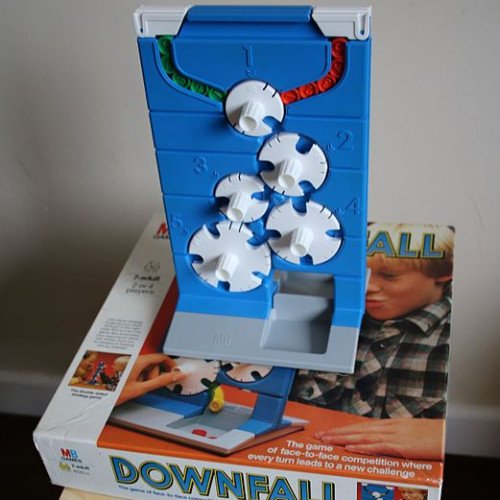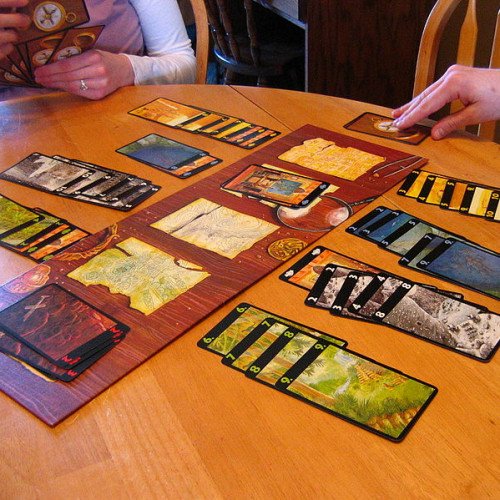DOWNFALL VS LOST CITIES

DOWNFALL
Downfall is a two-player game for players aged 7 and older, first marketed by the Milton Bradley Company in 1970. The game consists of a vertical board with five slotted dials on each side. Each player starts with ten numbered tokens or discs at the top of the board. The object of the game is to move the discs to the bottom of the board by turning the dials. Players alternate turns moving the dials and cannot move a dial that their opponent has just moved. The winner is the first player to move all of their discs into the tray at the bottom. An advanced version of the rules dictates that the discs arrive in the tray in numerical order. Since neither player can see the other's board, it is common to inadvertently advance - or hinder - the opponent's gameplay. The game rewards forward thinking and planning; players may try to "trap" their opponent into turning a dial that will advance their own disc, while trying to ensure that their own discs are not caught and dropped out of order. The game is currently available in the UK under the name New Downfall, manufactured and marketed by Hasbro. The new version follows the same rules but has a more futuristic design in red and yellow. The game's box art is parodied on the cover of Expert Knob Twiddlers, an album by Mike & Rich (Mike Paradinas & Richard D. James).
Statistics for this Xoptio

LOST CITIES
Lost Cities is a 60-card card game, designed in 1999 by game designer Reiner Knizia and published by several publishers. The objective of the game is to mount profitable expeditions to one or more of the five lost cities (the Himalayas, the Brazilian Rain Forest, the Desert Sands, the Ancient Volcanos and Neptune's Realm). The game was originally intended as a 2-player game, but rule variants have been contributed by fans to allow 1 or 2 further players, causing Reiner Knizia himself to later provide semi-official 4-player rules. Lost Cities is a fast-moving game, with players playing or discarding, and then replacing, a single card each turn. Cards represent progress on one of the five color-coded expeditions. Players must decide, during the course of the game, how many of these expeditions to actually embark upon. Card-play rules are quite straightforward, but because players can only move forward on an expedition (by playing cards which are higher-numbered than those already played), making the right choice in a given game situation can be quite difficult. An expedition that has been started will earn points according to how much progress has been made when the game ends, and after three rounds, the player with the highest total score wins the game. Each expedition that is started but not thoroughly charted incurs a negative point penalty (investment costs). Interaction between players is indirect, in that one cannot directly impact another player's expeditions. However, since players can draw from the common discard piles, they are free to make use of opposing discards. Additionally, since the available cards for a given expedition are finite, progress made by an opponent in a given color can lead to difficulty making progress in that same color. The game's board, while designed to supplement the theme, is optional and consists only of simple marked areas where players place discards. If Lost Cities had four expeditions instead of five, it could be played with a standard deck of playing cards. When doing so, the face cards would represent investment cards, with numbered cards two through ten serving as the expedition progress cards.